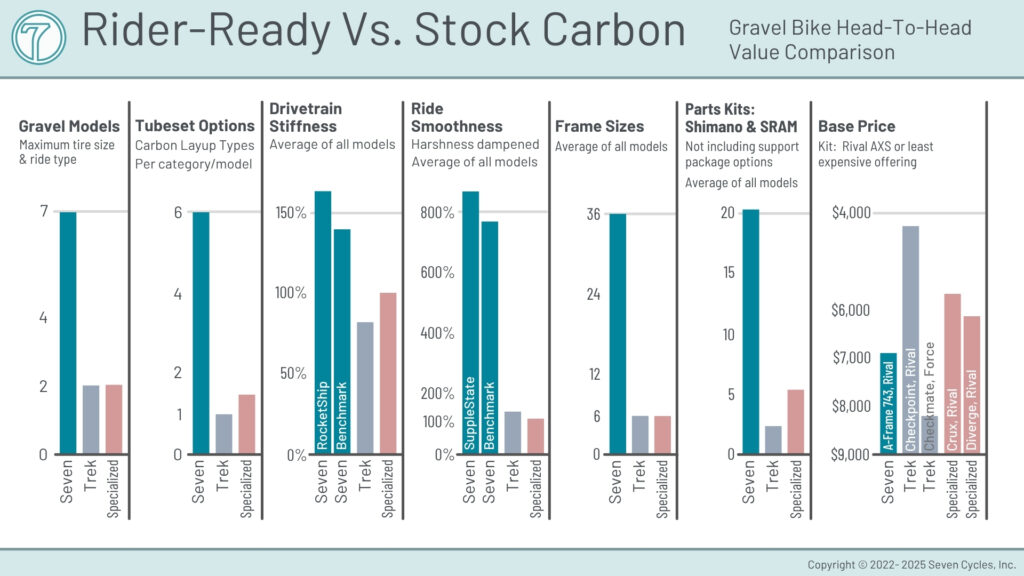Seven’s Rider-Ready bikes are our unique approach to building predetermined, curated designs. Sort of like stock bikes, but not at all.
Step Up From Stock.
Seven’s Rider-Ready bikes are handbuilt one at a time in our Massachusetts factory. We call it Simple-Custom because Rider-Ready strips away the complexities of full custom and provides a straightforward pick list of our most popular custom features and options.
Stock bikes don’t compare on any meaningful long-term measure.
This chart illustrates six ways in which Rider-Ready bikes are overwhelmingly better than stock carbon bikes. You can get all of this at a competitive price and have it built in the USA by Seven.
Chart Footnotes:
Sources for the Rider-Ready Vs Stock Carbon above. Data as of 2025.
Gravel Models
Trek has two gravel models: Checkmate and Checkpoint. Specialized has two gravel models: Diverge and Crux. Seven has seven Rider-Ready gravel models.
Tubeset or Carbon Layup Options
Trek has one layup for each of its two models: Checkmate is OCLV 800 Carbon; Checkpoint is OCLV 500 Carbon. Specialized has one carbon layup for the Diverge: SWAT 4.0 and two carbon layups for the Crux: 12r and 10r. That’s three layups for two models equals one point five layups per model. Seven offers five or six tubeset types (S, SL, XX, CT, PRO, and sometimes A-Frames) per model.
Drivetrain Stiffness
Seven’s drivetrain stiffness is, on average, about 50% higher than Specialized or Trek’s performance carbon drivetrains.
Seven uses Tour Magazine test data as our third-party source for drivetrain stiffness. The average drivetrain stiffness for performance carbon framesets in 2025 was 61 N/mm. Specifically, the Specialized Tarmac tested at 61 N/mm, while the Trek Emonda tested at 49 N/mm.
Seven offers three Rider-Ready tubeset designs to tune drivetrain stiffness to rider preference. Our RocketShip tubeset is about 70% stiffer than the average Tour-tested carbon drivetrain. Seven’s Benchmark tubeset averages about 50% stiffer than the average carbon drivetrain. Seven’s SuppleState, our lightest and plushest Rider-Ready tubeset, is about 15% softer and more lively. These percentages average all of Seven’s titanium tubeset offerings (S-Type, SL-Type, and XX-Type tubeset designs).
Note: We use Trek and Specialized’s closest Tour-tested models as stand-ins for their gravel designs; that is, the Emonda and Tarmac, respectively. We acknowledge that these frames are slightly lighter than their gravel equivalents and, as a result, the drivetrains are not as stiff. However, any possible stiffness variance cannot match the 50% gap between carbon and Seven’s average proprietary titanium drivetrain designs.
Ride Smoothness
Seven’s vertical compliance, or flow, is about 800% smoother than Specialized or Trek’s performance carbon framesets.
Seven sourced the Specialized and Trek harshness information from testing data published by Tour Magazine. The average vertical harshness of a 2025 carbon bike is 170 N/mm. The Specialized Tarmac is 156 N/mm, or 9% less harsh than average. The Trek Emonda, with a 131 N/mm stiffness rating, is 30% less harsh than the average carbon frameset.
The average Seven titanium SL-Type tubeset with Moto seat stays is about eight times smoother than the average results from Tour Magazine’s 2025 testing.
To further improve Seven’s smoothness, we offer three tubeset stiffness levels. Our SuppleState tubeset is the plushest. Seven’s Benchmark tubeset averages about 750% smoother than the average carbon bike. Seven’s RocketShip, while our stiffest Rider-Ready offering, is still about 600% smoother than the average carbon frame. The percentages average all of Seven’s titanium tubeset offerings (S-Type, SL-Type, and XX-Type tubeset designs).
Note: To estimate carbon frame harshness, we use Trek and Specialized’s closest Tour-tested models. That is Emonda and Tarmac, respectively. If anything, given that these frames are lighter than their gravel counterparts, the gravel designs will exhibit even harsher rides than the data we present.
Frame Sizes
Trek and Specialized both offer 6 sizes in their gravel models. Seven offers 36 sizes in the Rider-Ready bikes: Three stack heights for each of 12 top tube lengths.
Parts Kits
Seven offers an average of 20.1 parts kits per gravel model. Trek has an average of only 2.5 kits per gravel model. Specialized has an average of 5.5 kits per gravel model.
Shimano: Seven has 6.4 Shimano kits on average per gravel bike. Trek has zero Shimano offerings. Specialized has, on average, 2 Shimano-equipped gravel models.
SRAM: Seven offers 13.7 SRAM kits on average per gravel bike. Trek has 2.5 SRAM offerings. Specialized has 3.5 SRAM kits on average per gravel model.
Base Price
Seven’s US-made full-titanium A-frame with SRAM Rival AXS is $6,900. Trek’s carbon Checkpoint with Rival AXS is $4,300. Trek’s carbon Checkmate with SRAM Force AXS is $8,300. (Trek does not offer the Checkmate with a Rival kit as of the close of 2025.) Specialized’s Crux Rival AXS is $5,700. Specialized’s Diverge Rival AXS is $6,100.
The base prices above include a $70 service fee from both Specialized and Trek, which is not included in the price shown on their websites. When you add a bike to a cart, the service fee is displayed. That fee appears to change often.
We show prices for current parts kits only. Sometimes, Specialized and Trek display old inventory with previous-generation parts kits. We do not include outdated inventory in the bike comparison data.

